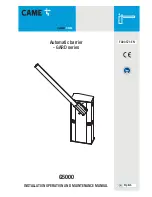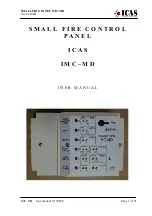
Warner Electric • 800-825-9050
P-2003-2 • 819-0420
13
o
5 . Remove the sense magnet lead from terminal
1 of terminal block TB2 and insert a DC current
meter in series with the lead of the sense magnet
and terminal 1 of terminal block TB2 .
Note:
Use a DC current meter that reads 0 to 500
mA with the Positive (+) lead connected to terminal 1
and negative (-) lead connected to the wire .
o
6 . Reapply power to the control system .
o
7 . Place the mode selector switch in the brake
“off” position . The meter should read zero output
current and the brake should free wheel .
o
8 . Place the mode selector switch in the brake
“on” or “stop” position . The meter should read
345 to 375 mA and the brake should be locked .
o
9 . Place the mode selector switch in the “run”
position and set the tension adjust potentiometer
to zero (or fully counterclockwise) . The meter
should read zero current output to the brake .
o
10 . Slowly rotate the remote tension adjust
potentiometer from fully counterclockwise to
full clockwise, noting that the output current
increases from zero to 345-375 mA at maximum
output . Leave this potentiometer at its maximum
setting .
o
11 . Slowly rotate the front panel tension adjust
potentiometer from its fully clockwise, or
maximum setting, to its fully counterclockwise, or
minimum setting . Monitor the meter, observing
that the current goes from 345 - 375 mA to zero
at the minimum setting .
o
12 . This concludes the control system checks .
Remove power and allow approximately 30
seconds before proceeding to the next step .
o
13 . Remove the meter and reattach the sense
magnet lead to terminal 1 of terminal block TB2
and secure it .
Proceed to step 14 in next section .
All Other Two Wire Tension Brakes
o
5 . Attach a DC voltmeter to terminals 2 and 3 of
terminal block TB2 .
Note:
Use A DC voltmeter that reads from 0 to 24
VDC . Connect the positive (+) lead to terminal 2 and
negative (-) lead to terminal 3 .
o
6 . Reapply power to the control system .
o
7 . Place the mode selector switch in the brake
“off” position . The meter should read zero
voltage and the brake should free wheel .
o
8 . Place the mode selector switch in the
brake “stop” position . The meter should read
approximately 24 VDC and the brake should be
locked .
o
9 . Place the mode selector switch in the brake
“run” position and set the remote tension adjust
potentiometer to the zero, or fully counter-
clockwise, position . The meter should read zero
voltage output to the brake .
o
10 . Slowly rotate the remote tension adjust
potentiometer from fully counterclockwise to
full clockwise, noting that the output voltage
increases from zero to approximately 24 VDC at
its maximum . Leave the potentiometer at its full
clockwise, or maximum, position .
o
11 . Slowly rotate the front panel tension adjust
potentiometer from its fully clockwise, or
maximum setting, to its fully counterclockwise, or
minimum setting . Monitor the meter, observing
that the voltage goes from 24 VDC to zero at the
minimum setting .
o
12 . This concludes the control system checks .
Remove power and allow approximately 30
seconds before proceeding to the next step .
o
13 . Remove the meter from terminals 2 and 3 of
terminal block TB2 and secure the leads to the
terminals .
o
14 . Reapply power to the control system .








































